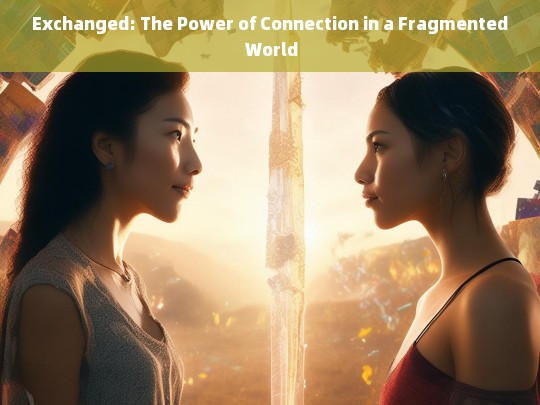In a world increasingly defined by digital interactions and fleeting connections, the concept of "exchanged" takes on profound significance. Whether it's the exchange of ideas, goods, emotions, or cultures, the act of exchanging is a fundamental human experience that shapes our relationships, societies, and even our sense of self. This article explores the multifaceted nature of exchange, its impact on our lives, and how it serves as a bridge in a fragmented world.
The Essence of Exchange
At its core, exchange is about giving and receiving. It is a reciprocal process that fosters connection and mutual understanding. From the earliest days of human civilization, exchange has been a cornerstone of survival and progress. Barter systems allowed communities to trade goods and services, while the exchange of knowledge and skills enabled the development of complex societies.
In modern times, exchange has evolved beyond the tangible. We exchange ideas through conversations, debates, and collaborations. We exchange emotions through art, music, and literature. We even exchange identities as we navigate different cultures and social contexts. Each exchange, whether big or small, leaves an imprint on our lives, shaping our perspectives and enriching our experiences.
The Digital Age: A New Frontier for Exchange
The advent of the internet and social media has revolutionized the way we exchange information and connect with others. In the digital age, exchange happens at an unprecedented scale and speed. A single tweet can spark a global conversation, while a viral video can bridge cultural divides. However, this rapid exchange also comes with challenges.
The sheer volume of information available online can be overwhelming, leading to information overload and the spread of misinformation. The anonymity of the internet can also foster toxic exchanges, where people feel emboldened to express hateful or divisive views. Despite these challenges, the digital age has also created opportunities for meaningful exchange. Online communities bring together people from diverse backgrounds, fostering empathy and understanding. Crowdfunding platforms enable the exchange of resources to support causes and individuals in need.
Exchange as a Catalyst for Change
Exchange has the power to drive social and political change. Throughout history, the exchange of ideas has been at the heart of movements for justice and equality. The civil rights movement in the United States, for example, was fueled by the exchange of stories, experiences, and strategies among activists. Similarly, the global climate movement has been propelled by the exchange of scientific knowledge and grassroots organizing.
In the realm of international relations, exchange plays a crucial role in diplomacy and conflict resolution. Cultural exchange programs, for instance, promote mutual understanding and cooperation between nations. Trade agreements, while often contentious, facilitate the exchange of goods and services, fostering economic interdependence and reducing the likelihood of conflict.
The Personal Impact of Exchange
On a personal level, exchange is a source of growth and transformation. Every interaction we have—whether with a friend, a stranger, or even ourselves—involves some form of exchange. These exchanges shape our identities, values, and beliefs. They challenge us to step outside our comfort zones and see the world from different perspectives.
Consider the exchange of gifts. While the act of giving and receiving gifts may seem trivial, it carries deep emotional significance. A gift is not just an object; it is a symbol of thoughtfulness, appreciation, and connection. The exchange of gifts strengthens bonds and creates lasting memories.
Similarly, the exchange of words—whether spoken or written—has the power to heal, inspire, and transform. A kind word can lift someone's spirits, while a heartfelt apology can mend a broken relationship. In therapy, the exchange of thoughts and feelings between therapist and client can lead to profound personal growth and healing.
The Dark Side of Exchange
While exchange has the potential to bring people together, it can also be a source of conflict and exploitation. The history of colonialism, for example, is marked by unequal exchanges that benefited the colonizers at the expense of the colonized. The transatlantic slave trade was a horrific exchange of human lives for economic gain. Even today, exploitative labor practices and unfair trade agreements perpetuate inequality and injustice.
In personal relationships, unhealthy exchanges can lead to emotional harm. Manipulative behavior, for instance, involves an unequal exchange where one person exerts control over another. Toxic relationships are often characterized by a lack of reciprocity, where one person gives more than they receive, leading to resentment and burnout.
The Future of Exchange
As we look to the future, the concept of exchange will continue to evolve. Advances in technology, such as blockchain and artificial intelligence, are transforming the way we exchange value and information. Cryptocurrencies, for example, enable peer-to-peer exchanges without the need for intermediaries, while AI-powered platforms facilitate the exchange of knowledge and expertise on a global scale.
At the same time, the challenges of the 21st century—such as climate change, inequality, and political polarization—demand new forms of exchange. We need to exchange not just goods and ideas, but also empathy, compassion, and a commitment to collective well-being. The future of exchange lies in our ability to create systems and relationships that are equitable, sustainable, and inclusive.
Conclusion
In a world that often feels fragmented and divided, the act of exchange serves as a powerful reminder of our interconnectedness. Whether it's the exchange of goods, ideas, or emotions, each interaction has the potential to create meaning and foster connection. As we navigate the complexities of the modern world, let us embrace the power of exchange—not just as a transactional process, but as a transformative force that can bring us closer together and help us build a more just and compassionate society.
In the end, it is through exchange that we find common ground, bridge divides, and create a shared future. So, let us exchange not just what we have, but who we are—our hopes, our dreams, and our humanity. For in the act of exchange, we discover the true essence of connection.





